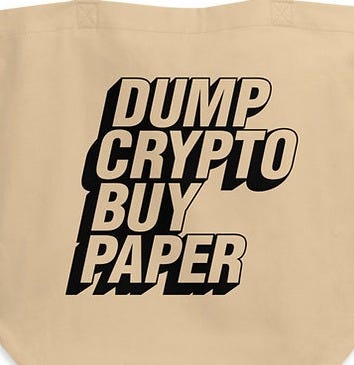
My concern about the embrace of crytpocurrencies at the highest level of finance, politics, and, well, ‘the culture’ had begun to abate recently. This has nothing to do with the fact that Bitcoin has raced to new record high prices in the aftermath of Donald Trump’s re-election to the US presidency at the beginning of the month - I own no crypto, and do not plan to invest in such securities.
I’m beginning to think I was wrong to start adjusting my opinion. That was prompted by a 26 November US Court Judgement, and in particular the reaction to it … but more on that in a moment.
Firstly, what had caused my opinion to shift to being less anti-crypto? Two factors.
The first is that the overwhelming majority of cryptocurrency transactions are now within the dollar system - more than 80% of crypto transactions are in stablecoins and the overwhelming majority of stablecoins - the market giant Tether (or USDT) and USDC. The second is that crypto exchanges and stablecoin issuers have increasingly shown themselves not to be impervious to the reaches of US law enforcement. Take four month jail sentence for billionaire Binance founder Changpeng ‘CZ’ Zhao handed down this April. CZ handed himself over to US officials to face the charges after spending years on the run (well hopping from crypto conference to conference in mostly non-US extradition treaty jurisdictions). But a four month sentence in exchange for remaining a billionaire from what is essentially a crypto laundering scheme? Not Bad!
The second is that the crypto industry had begun to show an awareness of the fact that it should not escape the reach of US national security policy and economic policy actions, just as banks in third countries comply with US sanctions. Binance even began to receive training in sanctions compliance, and others such as the one major US-domiciled (and publicly listed) platform Coinbase had also highlighted their commitment thereto.
My thinking as of at least two days ago could be summarised - the fox can be let into the henhouse once its domesticated, and that the fox (crypto industry) was starting to show signs of being responsive to petting.
But how wrong I was.
On 26 November, the United States Fifth Court of Appeals reversed an earlier district court judgement brought by five crypto industry plaintiffs against the US sanctions authority, the Office of Foreign Asset Controls (OFAC), over OFAC's 2022 blacklisting of the code underlying a technology called Tornado Cash. (ruling here).
Tornado Cash is a piece of software beloved of heroin traffickers, North Korean hackers, & Russian intelligence to undo blockchain traceability (one of the few things going for the crypto sector). It essentially serves to enable money laundering. According to OFAC’s 2022 designation announcement against the technology, has been used to launder over $550 million in gains seized from cybercrimes and served to enable sanctions evasion.
The court's logic is that code falls outside of the authority underpinning OFAC because its not mentioned in the International Emergency Economic Powers Act of 1977. The court then goes on to say that “mending a statute's blind spots or smoothing its disruptive effects falls outside our lane”, which is, fair enough. I will not claim to be a legal expert and while I’m expecting the move will be appealed, I also think the new Trump Administration could drop such an appeal or even endorse the Fifth Court’s ruling. After all, Commerce Secretary designate Howard Lutnick has been betting heavily on Tether’s success and his bank, Cantor Fitzgerald, is the only major Wall Street player to have directly partnered with such a stablecoin firm. The crypto sector also generally financed Trump’s campaign to the hilt.
And the sector has welcomed the ruling tremendously. Again, I’m not saying that it is wrong on the merits of the law, but rather that it is certainly not something to be celebrated for good economic actors. See, for example, this tweet from the Chief Legal Office for Coinbase, which as I said previously is at least the crypto platform that has done the most to tie itself to the US rather than outright trying to run away from US rules and laws (thats why FTX was based in the Bahamas, as is Tether, or so much of the wider crypto industry at least claims to be operating primarily outside the USA even as they target US ‘investors).
Alas, the fox is not a wolf. The Soviets claimed once they managed to domesticate them, I suspect it was limitations to the extent of the domestication that has stopped this from becoming a wider trend. Wolves can be domesticated - look at Wall Street’s record of sanctions compliance, its not perfect, but way better than cryptos. Alas, the foxes are about to not only be in the henhouse, but they will be in charge.




